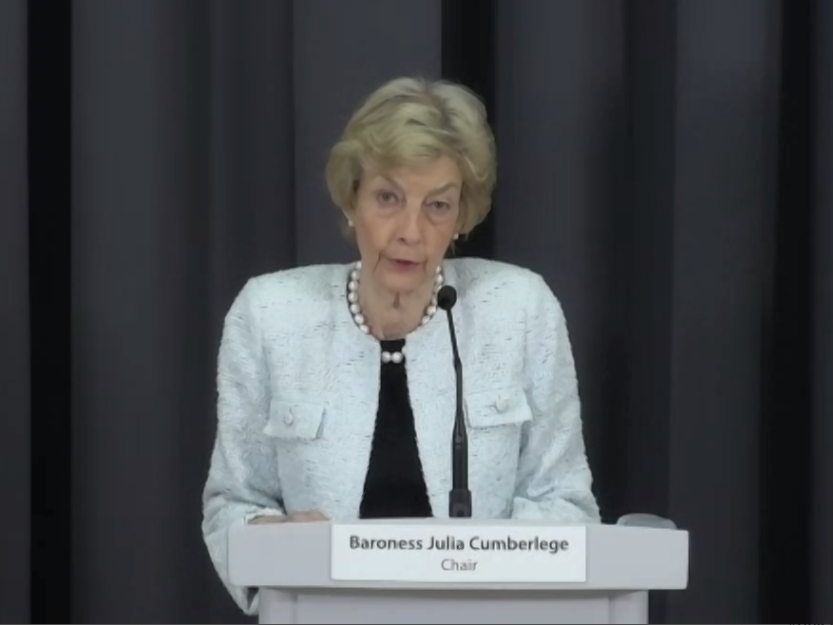Cumberlege inquiry: Tens of thousands of victims may be affected and ‘likely’ more tragedies elsewhere in health service
Inquiry chair warns women are still being prescribed sodium valproate during pregnancy, despite safety risks

Your support helps us to tell the story
From reproductive rights to climate change to Big Tech, The Independent is on the ground when the story is developing. Whether it's investigating the financials of Elon Musk's pro-Trump PAC or producing our latest documentary, 'The A Word', which shines a light on the American women fighting for reproductive rights, we know how important it is to parse out the facts from the messaging.
At such a critical moment in US history, we need reporters on the ground. Your donation allows us to keep sending journalists to speak to both sides of the story.
The Independent is trusted by Americans across the entire political spectrum. And unlike many other quality news outlets, we choose not to lock Americans out of our reporting and analysis with paywalls. We believe quality journalism should be available to everyone, paid for by those who can afford it.
Your support makes all the difference.Experts leading the inquiry into unsafe medicines and medical implants have warned they cannot rule out similar tragedies being caused by other drugs and devices.
Baroness Julia Cumberlege said the “concern is so great” as she warned that tens of thousands of women and children had already been affected by epilepsy drug sodium valproate, pelvic mesh and the hormone pregnancy test Primodus.
At a press conference today, Baroness Cumberlege also told journalists she was “surprised” the government had scheduled a major speech by chancellor Rishi Sunak on the same day, as the inquiry’s publication date had been “on the grid for three or four weeks”.
The report by the inquiry has laid bare widespread systemic failings in the healthcare system, where women’s concerns were ignored and where patients even now are being put at risk. The inquiry blamed a “disjointed, siloed, unresponsive and defensive” system.
The inquiry was commissioned by former health secretary Jeremy Hunt to examine the three scandals, but during their investigation, the team say they uncovered concerns with other products.
These included: contraceptive device Essure; acne treatment Roaccutane, which can lead to birth defects; breast implants; a vaccination for cervical cancer; valproate use in children; and the use of mesh in hernia repairs.
Asked by The Independent how much of a worry these were, Baroness Cumberlege said the “concern is so great”.
She said: “These interventions have caused avoidable harm to thousands of people, tens of thousands of people. If this government and the healthcare system ignores our review, and another medication or medical device damages people to the extent that we have witnessed, they will and should not be forgiven.”
Inquiry team member Simon Whale added: “Sadly, it is quite likely that there are other areas where similar problems, mistakes and tragedies have occurred.”
On the use of sodium valproate, Baroness Cumberlege told journalists: “Even today, this medication causes harm to unborn children, and pregnant mothers continue to be unaware of that fact and of the risks involved. Hundreds of women are taking valproate when they’re pregnant and not told about the risks. Health professionals simply don’t inform them. Regulators have not done enough when they should have done. And no one is tracing those that have been affected. And as a consequence, the woeful lack of support and help is palpable.”
She added that she would take some of the stories she had heard from the women and families to her grave. She said she was shocked that “no one knows the exact numbers affected by these three interventions, but it’s in the thousands, tens of thousands”.
Baroness Cumberlege criticised manufacturers for not supporting patients, saying: “Manufacturers also fail, they fail to acknowledge when their product causes harm. They fail to recognise their obligation to contribute towards help for patients who have suffered so grievously due to their products.”
The government is expected to make an initial response to the report in the House of Commons tomorrow.
Join our commenting forum
Join thought-provoking conversations, follow other Independent readers and see their replies
Comments